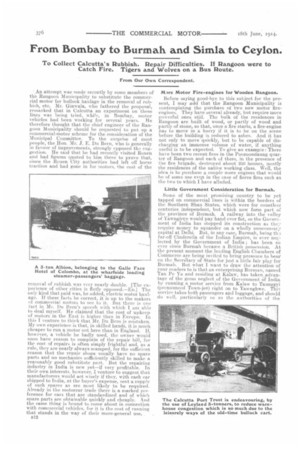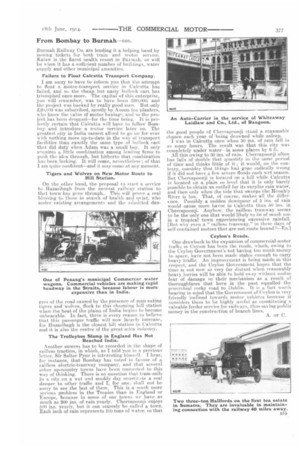From Bombay to Burmah and Simla to Ceylon.
Page 6

Page 7

If you've noticed an error in this article please click here to report it so we can fix it.
To Collect Calcutta' s Rubbish. Repair Difficulties. If Rangoon were to Catch Fire. Tigers and Wolves on a Bus Route.
From Our own Correspondent.
• An attempt was made recently by some members of the Rangoon Municipality to substitute the commercial motor tor bullock haulage in the removal of rubbish, etc. Mr. Ginwala, who fathered the proposal, remarked that in Calcutta an experiment on these lines was being tried, while, in Bombay, motor vehicles had been working for several years. He therefore thought that the chief engineer of the Rangoon Municipality should be requested to put up a commercial-motor scheme for the consideration of the Municipal Committee. To the surprise of most people, the Hon. Mr. J. E. Du Bern, who is generally in favour of improvements, strongly epposed the suggestion. He said that he had recently visited Rouen and had figures quoted to him there to prove that, since the Rouen City authorities had left off horse traction and had gone in for motors, the cost of the
removal of rubbish was vely nearly double. [The experience of other cities is flatly opposed.—En.] The only kind that paid was, he added, electric motor haulage. If these facts be correct, it is up to the makers of commercial motors to see to it. But there is one fact in Mr. Du Bern's speech with which I am able to deal myself. He claimed that the cost of upkeep of motors in the East is higher than in Europe. In this I venture to think that Mr. Du Bern is mistaken. My own experience is that, in skilled hands, it is much cheaper to run a motor out here than in England. If, however, a vehicle be badly used, the owner would soon have reason to complain of the repair bill, for the cost of repairs is often simply frightful and, as a rule, they are nearly always scamped. for the sufficient reason that the repair shops usually have no spare parts and no mechanics sufficiently skilled to make a reasonably good substitute part. But the repairing industry in India is new yet—if very profitable. in their own interests. however, I venture to suggest that manufacturers would net wisely if they, with each ear shipped to India, at the buyer's expense, sent a supply of such spares as are most likely to be required. Already in the motorcar trade there is a marked pre ference for cars that are standardized and of which spare parts are obtainable quickly and cheaply. And the same thing is bound to come about in connection with commercial vehicles, for it is the cost of running that stands in the way of their more-general use..
Mare Motor Fire-engines for Wooden Rangoon.
Before saying good-bye to this subject for the present, I may add that the Rangoon Municipality is contemplating the purchase of two new motor fireengines. They have several already, but require more powerful ones still. The hulk of the residences in Rangoon are built of wood, or partly of wood and partly of stone, so that, once a fire starts, a fire-engine .has to move in a hurry if it is to be on the scene before the building is reduced to ashes. And it has not only to move quickly, but to be capable of discharging an immense volume of water, if anything useful is to be expected. To give an example : There have been two recent fires in the Poozoondaung quarter of Rangoon and each of them, in the presence of the fire brigade, destroyed about 250 houses, mostly the residences of the native working class. Well, the idea is to purchase a.couple more engines that would be of some use even in the case of fierce fires such as the two to which I have alluded.
Little Government Consideration for Burmah.
Some of the most promising country to be yet tapped on cominereial lines is within the borders of the Southern Shan States, which were for countlesg centuries independent, but which now form part of the province of Burraah. A railway into the valley of Yawnghwe would pay hand over fist, so the Government of India has stopped its construction as they require money to squander on a wholly unnecessary capital at Delhi. But, in any case, Burmah, being th far-off Cinderella of the Indian Empire, is ever neleeted. by the Government of India ; has been so ever since Burmah became a British possession. At the present moment the leading English Chambers of Commerce are being invited to bring pressure to bear on the Secretary of State for just a little fair play for Burmah. But what I want to draw the attention of your readers to is that an enterprising Burman, named Tan Pe Yn and residing at Kalaw, has taken_advantage of the gross neglect .of the Government of India by running a motor service from Kala,w to Taunggyi (pronounced Town-jee) right on to Yawnghwe. This service takes both passengers and luggage, and should do well, particularly so as the authorities of the
Burmah Railway Co. are lending it a helping hand by issuing tickets fGr both train and motor service. Kalaw is the finest health resort in Burmah, or will be when it has a sufficient number of buildings, water supply and other municipal amenities.
Failure to Float Calcutta Transport Company.
I am sorry to have to inform you that the attempt to float a motor-transport service in Calcutta has failed, and so the cheap but nasty bullock cart has triumphed once more. The capital of this enterprise, you will remember, was to have been .4:60,000, and the project was backed by really good men. But only £20,000 was subscribed, mostly by Assam tea planters, who know the value of motor haulage, and so the project has been dropped—for the time being. It is perfectly certain that Calcutta will have to follow Bornbay and introduce a motor service later on. The greatest city in India cannot afford to go on for ever with nothing more up-to-date in the way of transport facilities than exact y the same type of hillock cart that did duty when Adam was a small boy. It only ci hires a little combination among leading firms to push the idea through, but hitherto that combination has been lacking. It will come, nevertheless ; of that 1 am quite confident—and it may come at any moment.
Tigers and Wolves on New Motor Route to Hill Station.
On the other hand, the proposal to start a service to Hazaribagh from the nearest railway station to that town has gone through.. This will prove a real blessing tu those in search of health and quiet, who under existing arrangements and the admitted clan gers of the road caused by the presence of man-eating tigers and 'wolves, flock to this charming hill station when the heat of the plains of India begins to become unbearable. In fact, there is every reason to believe that this passenger traffic will now largely increase, for Hazaribagh is the closest hill station to Calcutta and it is also the centre of the great mica industry.
The Trolleybus 'Slump in England Has Not Reached India.
Another success has to be recorded in the shape of tailless traction, in which, as I told you in a previous letter, Sir Salter Pyne is interesting himself. I hear, for instance, that Bombay has voted in favour of a raillesai electric-tramway company, and that several other up-country towns have been converted to this way of thinking. There is no question that tram-rails in a city on a wet and muddy day constitute a real danger to other traffic and I, for one, shall not be sorry to see the last of them. This is a much more serious problem in the Tropics than in F.ngland or Europe, because in some of our towns we have as much as 200 ins, of ram yearly. Cherrapoonji enjoys f.,00 ins. yearly, hut it can scarcely be called a town. Each inch of rain represents 100 tons of water. so that
the good people of Cherrapoonji stand a reasonable chance each year of being drowned while asleep. I was in Calcutta once wheo 30 ins, of rain fell in as many hours. The result was that this city was completely under water—in some places by 6 ft.
All this owing to 30 ins, of rain. Cherrapoonji often has falls of double that. quantity in the same period of time and thinks little of it ; it would, on the contrary, consider that things had gone radically wrong if it did not have a few severe floods each wet season. But Cherrapoonji is located on a hill while Calcutta is located on a plain so level that it is only barely possible to obtain an outfall for its surplus rain water, and then only when the tide that sweeps the Hooghly River is low. That, of course, makes all the differ• ence. Possibly a sudden downpour of 5 ins, of rain would cause more havoc in Calcutta than 50 ins. in Cherrapoonji. Anyhow, the railless tramway seems to be the only one that would likely to be of much use in a tropical town experiencing excessive rainfall. [But why even a. " Tailless tramway," in these days of self-contained motors that are not route bound ?—FD.1 Ceylon's Roads.
One drawback to the expansion of commercial-motor traffic in Ceylon has been the roads, which, owing to the Ceylon Government's not having too much money to spare, have not been made stable enough to carry heavy traffic. An improvement is being made in this respect, and the Ceylon Government hopes that the time is not now so very far distant when reasonably heavy lorries will be able to hold sway without undue fear of damage to their mechanism as a result of thoroughfares that have in the past equalled the proverbial rocky road to Dublin. It is a fact worth bearing in mind that the Government of Ceylon is very friendly inclined towards motor vehicles because it considers them to be highly useful as constituting a valuable feeder service for railways, thus saving public money in the construction of branch lines. A. OF C.
























